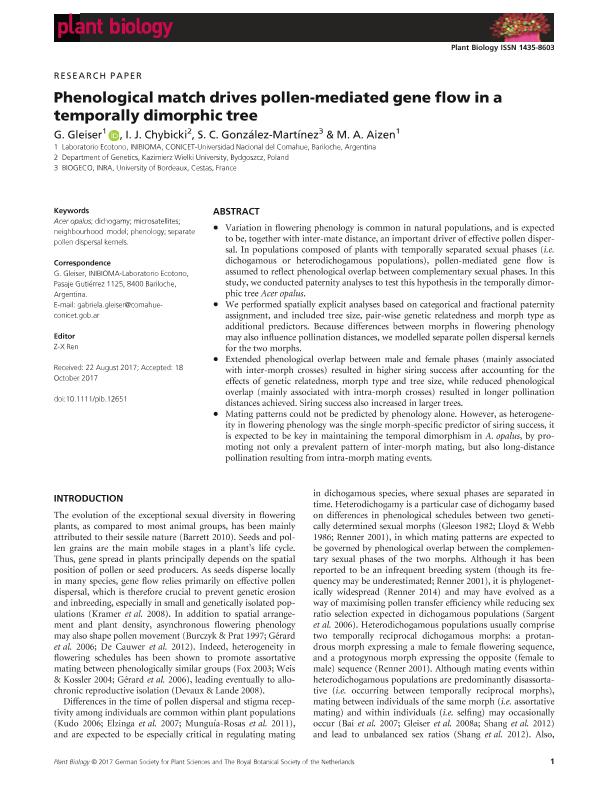Mostrar el registro sencillo del ítem
dc.contributor.author
Gleiser, Gabriela Laura

dc.contributor.author
Chybicki, I.J.
dc.contributor.author
González Martínez, S.C.
dc.contributor.author
Aizen, Marcelo Adrian

dc.date.available
2020-01-14T21:07:43Z
dc.date.issued
2018-01
dc.identifier.citation
Gleiser, Gabriela Laura; Chybicki, I.J.; González Martínez, S.C.; Aizen, Marcelo Adrian; Phenological match drives pollen-mediated gene flow in a temporally dimorphic tree; Wiley Blackwell Publishing, Inc; Plant Biology; 20; 1; 1-2018; 93-100
dc.identifier.issn
1435-8603
dc.identifier.uri
http://hdl.handle.net/11336/94711
dc.description.abstract
Variation in flowering phenology is common in natural populations, and is expected to be, together with inter-mate distance, an important driver of effective pollen dispersal. In populations composed of plants with temporally separated sexual phases (i.e. dichogamous or heterodichogamous populations), pollen-mediated gene flow is assumed to reflect phenological overlap between complementary sexual phases. In this study, we conducted paternity analyses to test this hypothesis in the temporally dimorphic tree Acer opalus. We performed spatially explicit analyses based on categorical and fractional paternity assignment, and included tree size, pair-wise genetic relatedness and morph type as additional predictors. Because differences between morphs in flowering phenology may also influence pollination distances, we modelled separate pollen dispersal kernels for the two morphs. Extended phenological overlap between male and female phases (mainly associated with inter-morph crosses) resulted in higher siring success after accounting for the effects of genetic relatedness, morph type and tree size, while reduced phenological overlap (mainly associated with intra-morph crosses) resulted in longer pollination distances achieved. Siring success also increased in larger trees. Mating patterns could not be predicted by phenology alone. However, as heterogeneity in flowering phenology was the single morph-specific predictor of siring success, it is expected to be key in maintaining the temporal dimorphism in A. opalus, by promoting not only a prevalent pattern of inter-morph mating, but also long-distance pollination resulting from intra-morph mating events.
dc.format
application/pdf
dc.language.iso
eng
dc.publisher
Wiley Blackwell Publishing, Inc

dc.rights
info:eu-repo/semantics/openAccess
dc.rights.uri
https://creativecommons.org/licenses/by-nc-sa/2.5/ar/
dc.subject
ACER OPALUS
dc.subject
DICHOGAMY
dc.subject
MICROSATELLITES
dc.subject
NEIGHBOURHOOD MODEL
dc.subject
PHENOLOGY
dc.subject
SEPARATE POLLEN DISPERSAL KERNELS
dc.subject.classification
Ecología

dc.subject.classification
Ciencias Biológicas

dc.subject.classification
CIENCIAS NATURALES Y EXACTAS

dc.title
Phenological match drives pollen-mediated gene flow in a temporally dimorphic tree
dc.type
info:eu-repo/semantics/article
dc.type
info:ar-repo/semantics/artículo
dc.type
info:eu-repo/semantics/publishedVersion
dc.date.updated
2019-10-10T13:47:03Z
dc.journal.volume
20
dc.journal.number
1
dc.journal.pagination
93-100
dc.journal.pais
Estados Unidos

dc.journal.ciudad
Hoboken
dc.description.fil
Fil: Gleiser, Gabriela Laura. Universidad Nacional del Comahue. Centro Regional Universitario Bariloche. Laboratorio de Ecotono; Argentina. Consejo Nacional de Investigaciones Científicas y Técnicas. Centro Científico Tecnológico Conicet - Patagonia Norte. Instituto de Investigaciones en Biodiversidad y Medioambiente. Universidad Nacional del Comahue. Centro Regional Universidad Bariloche. Instituto de Investigaciones en Biodiversidad y Medioambiente; Argentina
dc.description.fil
Fil: Chybicki, I.J.. Kazimierz Wielki University; Polonia
dc.description.fil
Fil: González Martínez, S.C.. Institut National de la Recherche Agronomique; Francia. Universite de Bordeaux; Francia
dc.description.fil
Fil: Aizen, Marcelo Adrian. Consejo Nacional de Investigaciones Científicas y Técnicas. Centro Científico Tecnológico Conicet - Patagonia Norte. Instituto de Investigaciones en Biodiversidad y Medioambiente. Universidad Nacional del Comahue. Centro Regional Universidad Bariloche. Instituto de Investigaciones en Biodiversidad y Medioambiente; Argentina. Universidad Nacional del Comahue. Centro Regional Universitario Bariloche. Laboratorio de Ecotono; Argentina
dc.journal.title
Plant Biology

dc.relation.alternativeid
info:eu-repo/semantics/altIdentifier/url/https://onlinelibrary.wiley.com/doi/abs/10.1111/plb.12651
dc.relation.alternativeid
info:eu-repo/semantics/altIdentifier/doi/http://dx.doi.org/10.1111/plb.12651
Archivos asociados
